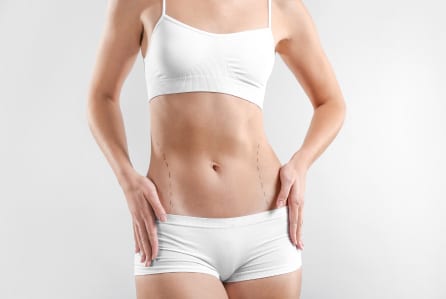Any cosmetic surgery is a serious procedure, and even minimally invasive treatments require patients to follow a few guidelines for optimal liposuction recovery. These guidelines can help control post liposuction pain, but they also are designed to ensure that the liposuction surgery has the best possible chance of improving the appearance.
That’s why proper healing is crucial both to your overall health and happiness post surgery, and to the long-term effectiveness of your liposuction procedure.
Here are 10 things New York City Plastic Surgeon, Dr Schulman recommends to my patients to help ensure that their bodies can heal properly after liposuction surgery
 Liposuction Recovery Time: Follow These 10 tips
Liposuction Recovery Time: Follow These 10 tips
1. Follow Doctor’s Orders
For some patients, it may seem too obvious a tip, but closely following the post operative care for liposuction or post-treatment instructions your Board Certified Surgeon provides is absolutely crucial. Your doctor is the expert on liposuction and is the only one who can provide their unique perspective on the recovery process for liposuction, having actually operated on your body.
No website will ever know as much about your body as your doctor does. The after-care instructions you get from your doctor are meant specifically for you based on your body and the procedures you’ve undergone. It can be tough to resist, but if you have questions or concerns about those instructions, you should consult your doctor rather than relying on the internet for advice.
2. Take Relaxation Seriously
For any surgery, your activity level is likely to be severely restricted for days or even a few weeks during your recovery for liposuction. While you’ll need to limit your activity level, it’s also important to remember that relaxation extends to your mind as well. That means you should avoid unnecessary mental and emotional strain as well as taking it easy on your body.
Many of my patients find it helpful to meditate each day or just to spend time in a quiet room, away from the daily hustle and bustle of their families.
3. Be Patient
The full effects of many cosmetic procedures can take as long as a year to be realized. I’ve worked with patients who find themselves disappointed when they look at their body following plastic surgery procedures and don’t see the jaw-dropping effects they’d hoped for. While that disappointment is understandable, it’s important to give your body plenty of time to adjust. Your body right after surgery will be swollen, and depending on the procedure, the new shape created has yet to fully take effect.
For instance, if your surgery involved fat grafting, which uses liposuction to take unwanted fat from one area of the body and transplants it to another that’s lacking volume, it will take some time for the fat cells to begin thriving in their new home. It can take up to a full year after surgery to see your final results – and in some people even longer.
4. Stay Indoors When You Can
The sun has notoriously bad effects on our skin, from causing cancer to dotting the face and neck with dark spots. But direct sunlight can be even worse for those healing from surgery. UV rays can make scars appear darker and redder and this can last for months. Additionally, excessive heat can worsen inflammation and swelling, which can increase your pain level.
Your skin may be numb, and you will be more likely to suffer a sunburn. If you do need to be outside for extended periods, I recommend applying sunscreen with an SPF of at least 30 directly to the scars. Remember that the UV rays are strong enough to penetrate clothing, so even if you are covered for up to six months, make sure to protect your healing liposuction scars.
5. Stop Smoking (and Don’t Vape)
Of course, nobody should smoke, but millions of Americans are smokers, and smoking is known to be an incredibly difficult habit to kick. In addition to raising your risk of cancer and heart disease, smoking can actually make your recovery from surgery much worse and more difficult. That’s because nicotine constricts blood vessels, which slows the healing process considerably and increasing your risk for wound healing issues and infection.
If you think vaping is safer, think again; one Juul pod contains 20 cigarettes’ worth of nicotine. You should quit smoking for more reasons than just surgical recovery, but consider this: The investment you’re making in cosmetic surgery could well be wasted if you continue smoking after your procedure.
6. Drink Plenty of Water
Keeping well-hydrated is a crucial aspect of ensuring successful recovery from cosmetic procedures. Drinking 6-8 glasses of water per day (juice, coffee, soda, and tea don’t count) can help flush your system of potential toxins, reduce your risk of infection, and speed the healing of your surgical incisions by boosting nutrient delivery.
Additionally, drinking lots of water can help prevent constipation, which is a frequent but unfortunate side effect of the pain medication you may be on. It is common after surgery to have a reduced appetite, which is even more reason to push the fluids. Electrolyte-containing drinks, such as gatorade or powerade, are helpful in keeping you well-hydrated.
7. Increase Your Protein Intake
As your body continues to recover, it will require increased amounts of nutrients to ensure proper healing. Protein is an especially helpful nutrient because it spurs production of new cells, such as collagen and blood cells, and because it can help strengthen your immune system. Your ideal intake level will depend on your healthy weight and level of activity approved by your Board Certified Plastic Surgeon, but men usually will need slightly less protein than women.
8. Move Your Body, but Don’t Strain Yourself
I’ve already told you to take it easy, so this could seem like contradictory advice. The fact is that some physical activity is good. Proper healing from cosmetic procedures doesn’t mean lying in one spot for weeks on end. In fact, lack of activity can increase your risk of blood clots as well as cause stiff and sore muscles. I recommend my patients move their bodies, whether by light walking or gentle stretching, at least once an hour when they’re awake.
Remember to always follow post-operative instructions on strenuous activity, such as going to the gym or lifting more than 10 pounds. Try to listen the signals your body is sending; if something feels like too much of a strain, it probably is.
9. Ask for Help from Others
During your recovery for liposuction, it will seriously impact your ability to meet the normal obligations of your life. This includes not being able to go to work for at least a couple of weeks after surgery, and it could even mean reducing your ability to care for your children or pets adequately for a brief period. Particularly for patients who are undergoing multiple procedures, such as a mommy makeover, or having invasive surgeries, it’s crucial to arrange help in the everyday tasks that are part of your life after outpatient procedure.
Asking for help can be a challenge for most people. We all want to feel independent. Forcing yourself to return to your normal activities too soon can not only jeopardize the effectiveness of your cosmetic procedures, but it can negatively impact your overall health.
10. Keep All of Your Post-op Appointments
The more successful a patient’s recovery is, the more likely some patients are to forego follow-up appointments. After all, many people think, “I feel good, so I’m sure everything is OK”. While this is an understandable inclination, skipping your follow-up appointments means that your doctor cannot monitor your progress or check for possible signs of infection.
Your doctor will only schedule follow-ups with you that are necessary, and most doctors will only release patients back to normal activities if they’ve been able to examine them in person.
 Questions and Answers
Questions and Answers
How long does liposuction take to heal?
Following liposuction procedures, the treated area will be securely wrapped, usually you wear compression garments or elastic bandages. This wrap is typically worn for 3 to 4 weeks, and if fat was removed from the calves or ankles, support hose may be necessary for approximately 6 weeks to aid in the recovery process.
What not to do after liposuction?
During liposuction recovery, it’s crucial to keep your compression garments on, except when showering or for essential tasks, unless your surgeon instructs otherwise.
Avoid vigorous exercise immediately post-surgery and refrain from smoking for 3-6 weeks following the procedure. You can enjoy light exercise upon your plastic surgeons approval.
What happens 2 weeks after liposuction?
First few weeks post-liposuction, swelling remains normal. Bruising should be diminishing, and you should experience improved comfort. Skin itching may occur due to the compression garment and reawakening nerves.
How long does it take to get back to work after liposuction?
Individuals who undergo liposuction on one or two body areas can typically resume work in as little as two days. For those undergoing liposuction on multiple areas, it’s advisable to plan for at least three days off work.
Learn more about Liposuction Recovery Time
Considering cosmetic plastic surgery now? Learn about liposuction before and after then schedule a consultation with board certified plastic surgeon Dr. Schulman today.
References
https://www.verywellhealth.com/recovery-after-liposuction-2709904



 Liposuction Recovery Time: Follow These 10 tips
Liposuction Recovery Time: Follow These 10 tips Questions and Answers
Questions and Answers
